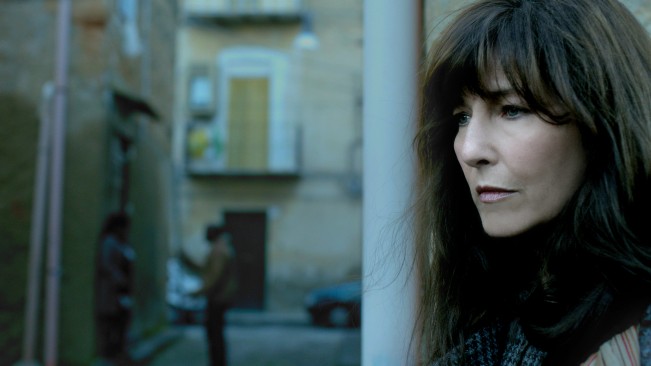By Kim Voynar Voynar@moviecitynews.com
Sundance 2014 Review: War Story
When I first saw Mark Jackson’s 2011 debut feature Without, I was impressed by the young director’s confident direction and meticulous pacing. Jackson’s willingness to let his protagonist, Joslyn, a young girl flailing emotionally in the aftermath of her friend’s suicide, live out her story quietly within the spaces between things was noteworthy among a slew of indie films that seemed so reluctant to ever let silence carry the story. With Jackson’s second feature, War Story, he once again focuses on a single female protagonist who’s lost in the aftermath of trauma, grief and loss (subjects, it would seem, that he’s not yet done exploring). This time around, he squares his lens on Catherine Keener as Lee, a photojournalist who works in war zones, who’s just lost her best friend and work partner in one of those tragic events that happen when you’re working around war and guns and people who like to shoot them.
War Story opens on Lee running from tragedy to Sicily, isolating herself from worried friends and colleagues. She avoids answering her hotel room phone, letting its incessant ringing wash over her. She roams restlessly with her camera, taking pictures that officials make her delete when they catch her at it. And she grows obsessed with a young girl, Hafsia (Hafsia Herzi), convinced she photographed this girl in Libya, weeping over the bloodied body of her younger brother. Hafsia insists she is not that girl, but the two form a bond somewhat resembling friendship, constructed around Hafsia’s need for help to solve a problem and to get to France, where she thinks she’ll find more acceptance and less prejudice and can rebuild her troubled life. Lee, perhaps seeking to assuage her own sense of guilt over photographing a young girl in a moment of grief now that she feels keenly herself what loss feels like, offers her help.
Lee’s story is a deeply insular one; she’s stuck inside her head, unable to let go of the horror of her friend’s final moments and her own unrelenting guilt over his death. And we feel Lee’s grief and numbness all the more deeply because of how Keener subtly reveals them through the little cracks that shatter the façade of control and detachment within which she, as a person who lives and breathes in a world of violence, death and suffering, has come to live. She’s trained herself to be able to capture the realities of war without allowing the horror of what her lens reveals to get inside her, and now she finds she can no longer do that. She doesn’t know how to cope with her rage and sense of loss, and all she can do is turn it all on herself and hide from the world. Lee’s numbness and loss are etched even more starkly in a scene with a colleague and mentor, Albert (Ben Kingsley), who’s sympathetic to Lee’s pain, but tries to smack her back to reality by bluntly reminding her: This is the life you chose. This is what you do. You see this suffering every day, and because it happened to your friend and colleague, who you should never have let yourself feel so close to in the first place, now you’re suffering. Get back out there, that’s all you can do.
It’s advice that’s easy enough to give, harder to take. Letting go of grief, shrugging off the mantle of a deep depression after a trauma like what she’s been through, isn’t as easy as just saying, well, I guess that was just another day in the salt mines, carry on. The death of Lee’s friend has perhaps made her see the wages of war as a price higher than she ever thought she’d pay to be in the thick of it. She’s captured so many losses, so many tragedies, through the lens of her camera, but she has no idea how to capture and cope with her own. The film’s final moments elegantly underscore the truth about the death of those we love and how we grieve the impact of losing them: It hurts, it will always hurt, when you lose someone you love, and even more so when you feel yourself responsible. But life moves on, wars continue to happen, the world spins around its axis just like it did before you lost this person you cared about. And somehow, you have to find a way to crawl up out of that dark and insular space you’ve retreated within, to find a way to live within the world again.
Back in 2011, Without made my top ten list, and I wrote that Jackson was an upcoming director to watch. Three years later, he’s fulfilled the promise he showed with his first film, delivering a sophomore effort that’s even better, more assured than I could have hoped. Beautifully, stunningly shot by Reed Morano (Frozen River, Kill Your Darlings), one of my favorite cinematographers, and scored hauntingly with some gorgeous cello-centric composition by Dave Eggar, War Story is cinematic storytelling at its finest. This is the hallmark of a true artist – to reach beyond the mundane, ignore what others are doing, give your actors room to breathe and to find their own truth, and paint it all on a canvas in such a way that marks it uniquely as your own uncompromised vision. With War Story, I think it’s safe to say Jackson’s found the storytelling niche of a rising auteur, and he plans to stay there.
















